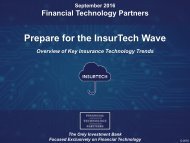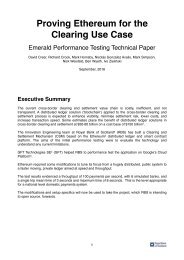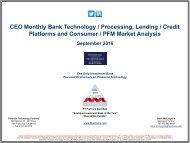Bitcoin and Cryptocurrency Technologies
1Qqc4BN
1Qqc4BN
You also want an ePaper? Increase the reach of your titles
YUMPU automatically turns print PDFs into web optimized ePapers that Google loves.
Order books.The final piece of a prediction market is a decentralized order book. Once again this is a<br />
pretty general concept, <strong>and</strong> realizing it would allow many other applications. What’s an order book?<br />
In real prediction markets, or most financial markets, there isn’t a single market price. Instead there<br />
are bids<strong>and</strong> asks which are listed in the order book. A bid is the highest price that anyone is willing to<br />
buy a share for, <strong>and</strong> the askis the lowest price that anyone is willing to sell the share for. Typically the<br />
ask is greater than the bid (otherwise there would be two participants who would be matched up, a<br />
trade would occur, <strong>and</strong> at least one of the orders would no longer remain in the order book). A<br />
participant who wants to buy a share right away can do so at the ask price <strong>and</strong> a participant who<br />
wants to sell right away can do so at the bid price. These are called “market orders” since they<br />
execute at market price, as opposed to the “limit orders” that are recorded in the order book that<br />
execute at the specified limit price (or better).<br />
Traditionally this has been done in a centralized way with a single order book service (typically an<br />
exchange) that collects all the orders. The problem, as is typical of centralized services, is that a<br />
dishonest exchange might profit at the expense of the participants. If the exchange receives a market<br />
buy order, they might themselves buy from the best ask before placing the order they received, then<br />
turn around <strong>and</strong> sell the shares they just bought at a higher price, pocketing the difference. This<br />
practice is called frontrunning. It shows up in a variety of financial settings, <strong>and</strong> it's considered a<br />
crime. Centralized order books require legal enforcement in order to discourage frontrunning <strong>and</strong><br />
ensure confidence in the integrity of the system.<br />
In a decentralized order book, we can’t rely on strong legal enforcement. But there's a clever solution,<br />
which is to simply forget about frontrunning. Instead of declaring it a crime <strong>and</strong> defending against it,<br />
we’ll call it a feature. The idea is that anybody can submit limit orders to miners by broadcasting<br />
transactions, <strong>and</strong> miners can match any two orders as long as the bid is greaterthan or equal to the<br />
ask. The miner simply gets to keep the difference as a form of transaction fee. Now miners have no<br />
incentive to frontrun because frontrunning an order will never be more profitable than simply<br />
fulfilling it <strong>and</strong> capturing the surplus.<br />
This is an elegant way to build a decentralized order book. The main downside is the miner fees that<br />
traders must pay. To avoid paying that fee, people might submit much more conservative orders <strong>and</strong><br />
may not be willing to reveal up front the best price at which they are willing to trade. This might make<br />
the market less efficient. We don’t yet know how this kind of order book with miners matching orders<br />
will function in practice, but it seems to be a promising idea.<br />
In conclusion, <strong>Bitcoin</strong> as it is today can act as a platform for a variety of applications. But for some<br />
applications <strong>Bitcoin</strong> only takes us so far. It doesn't have all the features we need for a secure<br />
decentralized prediction market or a decentralized order book.<br />
263









